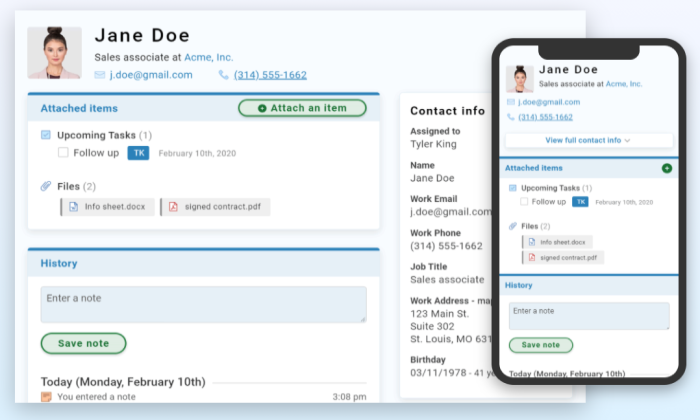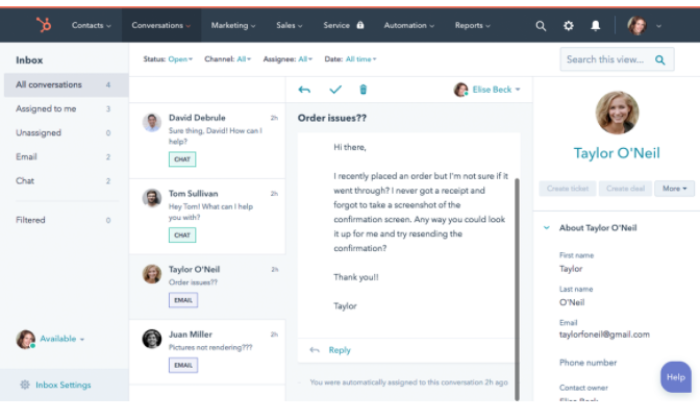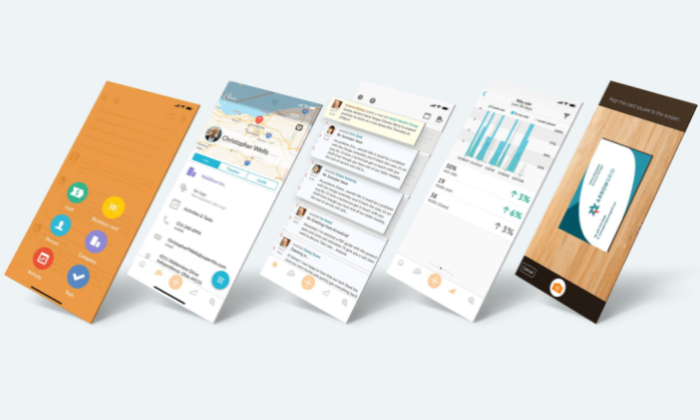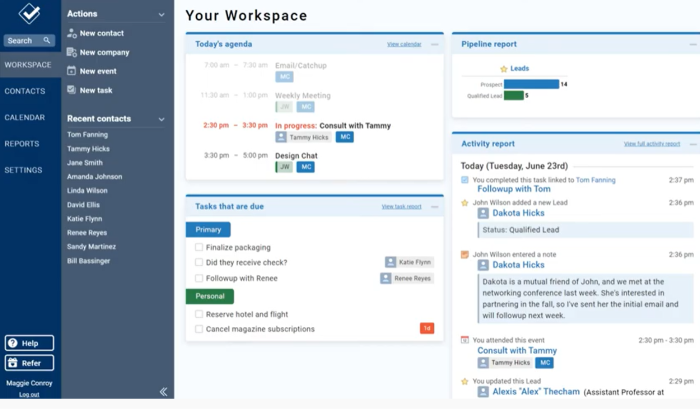
Disclosure: This content is reader-supported, which means if you click on some of our links that we may earn a commission.
Most small business owners that I know want more, happier customers.
Customer relationship management (CRM) software is designed to help companies with that exact goal. So why aren’t they using it?
My guess is that it’s because CRM software has a reputation for being massive, expensive, and really challenging to use.
That was true, but it’s not anymore.
In fact, there are dozens of CRM software solutions that small businesses can start using this afternoon. They’re affordable, sleek, and ready to help teams connect with customers on their own terms.
Here’s my list for the best CRM software choices to take your small business to the next level.
The Top 4 Options For Small Business CRM Software
- HubSpot – Best for scaling quickly
- Nutshell – Best for B2B sales teams
- Less Annoying CRM – Most affordable solution for sales and marketing
- Nimble – Best for teams using Microsoft 365
How to Choose the Best Small Business CRM Software for You
A small business owner could spend a full year trying out every CRM software option, and they might make it through a quarter of the products available right now.
To find a product that’s going to work—without spending a lifetime doing it—you’ll need to focus on what’s really going to really add value, save time, and provide useful insight for your company.
Right out of the gate, you are going to be able to eliminate some otherwise decent options by looking at how the nuts and bolts line up with your specific situation.
I’ve called these the essential considerations. With CRM software for small business, these points are even more important. Here’s why:
- Ease-of-use: Everyone using the CRMs has to input accurate information or the platform will be useless. Avoid an elaborate onboarding process for every hire by finding something that’s easy enough for non-techies to use and troubleshoot issues on their own.
- Integrations: A CRM has to tie into the tools you are already using. Direct integrations are great because DIY and API integrations can easily break at scale. Centralizing the tools a small business uses is better than adding to the stack.
- Channels: A CRM has to collect customer information no matter where it’s coming from—talk, text, chat, social, and so on. If it can only connect with a limited number of the channels you use, information will be incomplete, and customer experience fragmented.
- Price: If growth is the goal, the platform you choose should fit your budget moving forward. Cost may vary based on numbers of users, contacts, emails, etc. Budget this out to avoid hitting annoying limits or having to switch CRMs. No small business wants to spend resources migrating their customer data while they’re trying to grow.
There may be a CRM that strikes you as very appealing until you discover that the must-have integrations and channels are not available. It’s better to double-check the essential considerations before getting into the nitty gritty.
Once you find a shortlist of products that satisfy these, then it’s time to look at how each product manages the three core responsibilities of CRM software as they relate to your business: contact management, process automation, and reporting & business intelligence.
Organizing and tracking contacts
The chief responsibility of CRM software is to help companies organize and track every contact in their database. How they accomplish this goal is a little different from one platform to another.
Small business owners need to ask the following questions about each option:
- Will it help teams grow their contact list? Look for sites, landing pages, forms, and other touchpoints where interested customers can find the business and establish a connection.
- Will it help teams refine their contact list? Look for products with robust segmentation features.
- Will it help teams manage their contact list? Look for tools that allow users to make notes, set appointments, and schedule calls directly within the interface.
- Will it provide teams with real-time customer insights? Look for tools that make entire customer histories available no matter where users are working (inbox, chat, phone, etc.)
- Will it help teams meet their goals? Look for options that provide frameworks for reaching objectives like closing deals, resolving customer problems, and nurturing long-term relationships.
When it comes to CRM software, small businesses need a tool that’s going to help them reach all those bolded objectives.
For some, this is going to entail a sales pipeline and marketing automation features. Others may be more focused on outfitting an ultra-responsive help desk. Some may need all of it.
Some will also come with outreach tools you can use on social media, turning passerbys on Twitter and Facebook into your next customer.
Start with your customer-focused goals, and work backwards from there to figure out which CRM software is going to really help your teams stay on top of every relationship.
Process automation
Generally speaking, there are two different levels of automation that come with CRM software. Both can make a big difference to small businesses.
The first is automating routine tasks like data entry.
These platforms create contacts automatically whenever a rep or agent starts a conversation with a customer who is not in the database. Instead of having to go in and create a customer, the CRM software auto-generates a new profile or gives a user the option to create it in a single click.
Some CRMs look at the domain on the email, scour public databases, and fill in as much information as possible on its own. Some will automate list segmentation, which essentially groups customers based on criteria you set, such as age, gender, buying habits, or location.
A marketing team that wants to get thousands of emails out to interested customers can query the CRM based on relevant criteria (for example, customers who subscribed in the last 90 days) and their list is ready to go.
Each minute saved is more time to generate leads, close deals, and resolve issues. Plus, all the customer data is right there, all the time, with no extra time spent hunting it down.This is just one example, but good CRM software is constantly working behind the scenes to eliminate many of the routine tasks, saving minutes during every interaction.
It also makes automating workflows a very powerful capability. The marketing team that just generated a list of thousands of recent subscribers can begin an automated email campaign instantly.
As contacts enter the sales pipeline, tasks can automatically be assigned to the right rep. When a customer has a problem, they can automatically be routed to the right agent.
From streamlining customer onboarding processes to closing more deals quickly, CRM software can help small businesses do more with less..
Reporting and business intelligence
CRM software gets loaded with information that can help small businesses make decisions about where to focus their energy and resources.
This goes way beyond simple metrics like conversion rates. Say you want to increase the number of customer service interactions that are resolved on the first call. CRM software can provide the information necessary for teams to see what tactics are working and pivot accordingly.
With segmentation features and a rich picture of each relationship, you can really drill down into why some leads are converting and others are not.
Some of the more robust CRM platforms come with rich analytics features that convert overwhelming amounts of customer data into clear visualizations. Many let you customize dashboards to track key metrics, turning your database into actionable insights.
The Different Types of Small Business CRM Software
For a lot of SMBs, the really ritzy CRM software is not a feasible option.
Taking the prohibitively expensive and chunky products off the table, there are two types of CRM software that work great for small businesses. These will keep costs reasonable without sacrificing on the important functions that companies need.
Free CRM software
I’ve blogged about the best free CRM software, which can be an amazing zero-cost solution for small businesses.
They can handle the core CRM duties, like contact organization and tracking, as well as other features that vary depending on the platform. Some have sales pipelines, others have helpdesk features geared toward customer service.
There are limits, sure. The reporting won’t be as detailed and there’s definitely less ability to customize the platform. But depending on an organization’s needs, these free forever products can work for months, if not years.
And even when they won’t work as a long-term solution, these options actually give people a chance to really understand the tools. Instead of testing the product during a 2-4 week trial, companies can see how it performs across a few business cycles.
Specialized CRM software
Marketing teams need to start relationships with customers they don’t know yet. So the toolkit they need is going to be different from customer service, even if they are doing a lot of the same things, like organizing contacts, responding to emails, and sharing content.
To this end, some of the most useful CRM software for small business is built to serve the specific needs of different departments. These are:
- Sales CRM software
- Marketing CRM software
- Customer service CRM software
Specialized CRM software may come as a standalone solution, like Nutshell, or as a modular part of a larger system that can be purchased individually.
Hubspot, for example, offers CRM software for marketing, sales and customer service. People can pick one, two, or all three of these modules.
#1 – HubSpot — Best for scaling quickly
HubSpotCRM is the option for small businesses that are on the fence about whether or not they need dedicated CRM software.
First of all, their freemium plan is bananas in terms of how much they give you. You get chatbots, sales pipelines, and literally dozens of other features you would normally have to pay for.
On top of that, you get unlimited users and it’s free forever, so you don’t have to worry about how many contacts you make while you’re trying to grow.
When you are ready, you can upgrade individual “Hubs” to get advanced tools for sales, marketing, customer service, and content management. Only pay for what you need.
Okay, so let’s take a look at how the free HubSpotCRM can make an impact on day one.
Inside a HubSpot-enabled inbox, for example, users can see every contact’s history in a sidebar. This includes past interactions (across any channel), but also recent activities from the contact’s social channels.

It provides every HubSpot user with up-to-date customer insight no matter where they are working. Whether they are chatting with a confused customer or crafting a proposal, agents and reps can deliver personalized, relevant information with ease.
HubSpot can do this because everything is centralized within a client record in the CRM. Every ticket, conversation, and email is captured and organized without any legwork.
Cutting down on data entry frees people up, giving them more time to dedicate to each client.
In addition to phenomenal contact management, there is a ton more functionality in their free plan, which includes:
- Ticketing
- Live chat and conversational bots
- Reporting dashboards
- Gmail and Outlook integration
- Email tracking and notification
- VoIP calling
There’s even more on top of that, believe me.
It will take a little time for users to get fully acquainted with everything that’s included. One, because there is so much, and two, because HubSpot has their own jargon and way of doing things known as inbound marketing.
This isn’t a downside at all, considering how many companies have used inbound marketing to explode their customer base.
If you are already all about inbound marketing, HubSpot is far and away the obvious choice for CRM software. And even if you aren’t, the platform is flexible enough to work for any strategy, and easy enough to get people onboard.
With the premium Hubs, you’ll be able automate processes by building out workflows for customer service, sales automation, marketing automation, email automation, and more.
Looking at pricing for the paid plans, the Starter Growth Suite is a great option for small businesses that will benefit from Hubspot’s premium features. It starts at $50/month, and comes with additional features for sales, marketing, and customer service.
For companies that are already using HubSpot’s marketing and sales tools, the addition of their CRM software is a no-brainer.
For teams new to CRM, HubSpot’s freemium plan is really generous. A small business will be able to get a good sense of whether or not they like the HubSpot way of doing things.
And if they like HubSpot, nothing else will do. Try it for free today.
#2 – Nutshell — Best for B2B Sales Teams
Nutshell offers a nice balance of user-friendliness and sophistication that works extremely well for B2B sales teams.
Reps get the information, support, and collaborative tools they need to start selling smarter, even over a long sales cycle.
B2B deals take time and engagement with various stakeholders throughout the process. Keeping track of everything that’s involved across multiple deals is hard.
Nutshell keeps important people and conversations from falling through the cracks. Their CRM interface is really welcoming (your reps will actually want to use it) and their mobile app is just as good.

Edit contacts, log meeting notes, receive alerts, and scan business cards to create new leads, all directly within the iOS or Android app.
Lots of CRM software options come with mobile apps, but not all of them have a great reputation. HubSpot, for example, has a lot of work to do in this area, whereas Nutshell provides a best-in-breed service.
Sales reps need the ability to provide a quote without having to call back to the office. With the Nutshell mobile app, they can access client information, product catalogs, and generate a quote on the spot.
The iron doesn’t stay hot forever, especially in a crowded space full of competitors that are reaching out to your customers on every channel.
Nutshell is also loaded with tools that help B2B sales teams coordinate. Never miss another lead, double-book an appointment, or forget to touch base with features including:
- Customizable sales pipelines
- Leaderboards
- Communication histories
- Activity reminders
- Team @mentions and alerts
- Click-to-call and phone recordings
The reporting and performance tracking features make sales management more efficient and productive over the long term.
Sales leaders get both real-time insights from customizable dashboards and the ability to pull reports about new leads, losses, win-rate, pipeline growth, sales cycle size, and more.
Pricing for Nutshell is really straight forward:
- Starter: $19/month per user
- Pro: $35/month per user
With Starter, you get a sleek, no-frills CRM software solution that will work wonders for your sales team. With Pro, you get many more tools for sales automation, including:
- Guided sales process builder
- Automated lead assignment, advancement, and pipeline distribution
- Post-sale lead management
Nutshell syncs with G Suite, Microsoft 365, Outlook, and Exchange. They also offer one-click integrations with the best email marketing services, like MailChimp and Constant Contact, as well as other important business tools like Slack and Quickbooks.
Out-of-the-box, no other small business CRM software is as well designed for the challenges that face smaller B2B sales teams. It comes down to the fully-functional mobile app, the collaborative tools, and the rich sales reporting.
Nutshell is like getting the best parts of Salesforce at a fraction of the price. It won’t work across the entire organization as well, but for a B2B-focused sales team, everything is right there. The only difference is that Nutshell is much easier to use and doesn’t require a developer to set up.
Nutshell’s customer support is always available by phone, email, or chat, and there is a comprehensive self-service knowledge base online. They also offer free data importing assistance when you sign up, making the transition as smooth as possible.
Empower your sales team and start your 14-day free trial of Nutshell today.
#3 – Less Annoying CRM — Most Affordable Solution for Sales and Marketing
Less Annoying CRM has one goal and I bet you can guess what it is.
It’s a simple platform with transparent, affordable pricing. They know that small businesses need a CRM solution but can’t spend all of their money or time on software.
Enter Less Annoying CRM, or LACRM for short.
This is a low-cost, high-performance tool for managing and organizing all of a company’s contacts in a single platform. Users sign into their LACRM workspace and are instantly brought up to speed about all their most important customer relationships.

There is an agenda of their events for the day, a prioritized task list, a pipeline report, and an activity report. Individuals can see the status of all their activities and leaders will also be able to see the activity status of anyone they manage.
Say goodbye to post-it notes and forgotten conversations.
Every task, appointment, and document can be linked to an individual contact or company. Because every member has all the information they need in front of them, there’s no more emailing back and forth to figure out a course of action.
I really recommend LACRM for companies that want to make the lives of their sales and marketing teams more manageable, but don’t want to pay through the nose. It’s not the most visually appealing platform on the market, and the email integration can be finicky at times.
There’s also no customer service module. This is something to keep in mind if you plan on having a unified CRM in the future, as LACRM does not have pre-built integrations for other CRM or help desk software.
Still, for sales and marketing, LACRM is stocked with features to increase outreach and drive sales, including:
- Built-in calendar
- Customizable pipelines
- Role-based access control
- Customizable fields for contacts
- Email integration
- Integration with MailChimp
LACRM is definitely a pipeline-focused product, which is great for sales. But it’s really flexible. Teams can use the platform to develop referral programs, loyalty programs, as well as track customer feedback and marketing expenses.
The price of LACRM is $15/month per user. End of story. There are no contracts, pricing tiers, usage limits, or upsells.
It’s not going to work as well for larger companies with complex reporting and automation requirements. For smaller businesses and teams, though, LACRM is winning over users everyday.
It’s just the tool they are looking for, at a price that makes sense.
Their focus on being less annoying extends to their customer service. When you sign up, they take pains to make the process as easy as possible, reaching out and assisting wherever you need help.
Updates are seamless and free. Your data is always backed up on multiple Amazon Web Services servers.
If less annoying sounds good, you can try their platform free for 30-days without giving your credit card information. After that, it’s a predictable monthly payment with absolutely no surprise charges.
#4 – Nimble — Best for Teams Using Microsoft 365
Nimble is a great CRM for small businesses that don’t want to change the way they do business. It has integrations with more than 160 business apps that will pull all of your contacts, conversations, appointments, inboxes, and social media connections into a single interface.
For teams that are using the Microsoft 365 productivity suite (formerly Office 365), Nimble is simply the best CRM.
Tools like Microsoft Outlook are set up to handle basic contact management needs, but users constantly find that they have to Google information or keep multiple tabs open to track everything they need.
With Nimble enabled, Outlook is smarter. The Nimble sidebar contains rich information about each contact, as well as any linked appointments, deals, events, and so on.

Instead of the basic info, Nimble provides a full digital dossier of the contact, which is always up to date across your Microsoft environment. Whether you are working in Teams, SharePoint, or Dynamics, all of the information you need is within the interface.
Think of it as the missing CRM piece for Microsoft 365. Your teams can still work the way they always have, but now they get features like:
- Sales pipelines
- Intelligent email tracking
- Activity reminders, alerts, and notifications
- List segmentation features
- Sales and customer dashboard
- Sales forecasting and analytics
- Group email marketing
Nimble doesn’t have a dedicated customer service module, so I really recommend it on its sales and marketing merits. If you really need customer service, HubSpot has you covered and provides a similar feel, though the Microsoft 365 integration is not as tight.
The pricing for Nimble Business starts at $19/month per user. One thing to note is that each user gets 2GB of storage, after which it is $10/month per 10 GB of additional storage.
Nimble works with G Suite, as well, but the Microsoft 365 integration is more complete, making it a better choice for companies that have already invested time and energy in the Microsoft ecosystem.
Try Nimble free for 14 days to see if your teams reap the benefits of a more streamlined experience.
Microsoft may release CRM software one of these days, though it will probably cost a lot more than Nimble and come with features no small business is asking for.
Summary
I started blogging more than 10 years ago. Just me and a screen.
My business has a lot of moving parts now. Though it’s still “small” by the industry standard of less than 50 people, we communicate with thousands of customers every hour through our content, emails, newsletters, and podcasts.
Small teams need powerful tools when it comes to managing customer relationships. All of these CRM options provide the features necessary for teams to stay organized as they grow.
For teams looking to expand their outreach, Less Annoying CRM is going to get the job done at a really competitive price. As they benefit from being able to connect with more customers, they can bring on new team members at the same low rate.
Teams that are working in a Microsoft environment should shortlist Nimble. It’s been engineered to work across the Microsoft environment, meaning teams aren’t going to have to change their processes to get onboard.
For B2B sales teams, Nutshell is purpose-built to handle the long, unpredictable sales cycle. The collaborative tools and powerful mobile app enable every rep to be ready to strike when the iron is hot.
If you are looking for a full-stack CRM solution, HubSpot is the choice for small business. The freemium plan is second to none, in terms of depth, and it’s the only option on this list that has a dedicated customer service module.
The post Best Small Business CRM Software appeared first on Neil Patel.
source https://neilpatel.com/blog/best-small-business-crm-software/